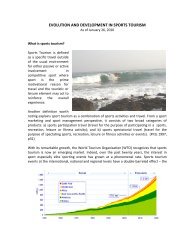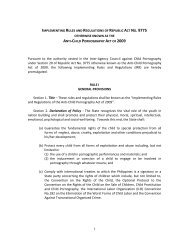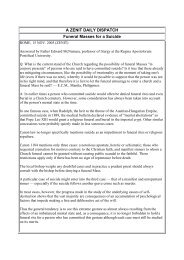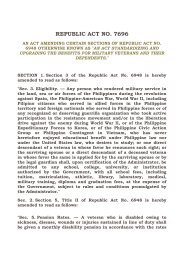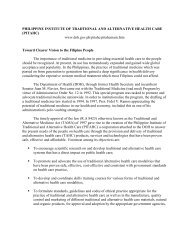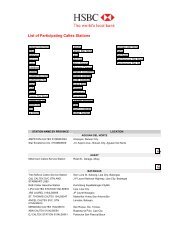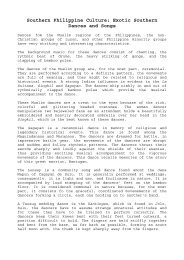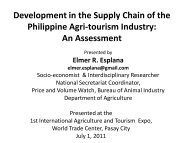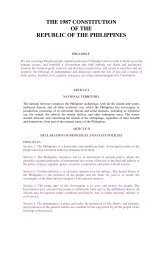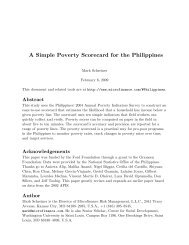Trafficking Of Women And Children
Trafficking Of Women And Children
Trafficking Of Women And Children
Create successful ePaper yourself
Turn your PDF publications into a flip-book with our unique Google optimized e-Paper software.
The professional qualifications of Judge Vilches are: Professor, Ateneo Law School andrecipient of the Chief Justice Ramon Avecena Professorial Chair in Civil Law for the year2003-2004; a Member of the Faculty and Research Group of the Philippine JudicialAcademy (PhilJA), Supreme Court; Lecturer for the UP Law Center and Institute of JudicialAdministration UP-IJA) to train Nepal judges and justices, the Integrated Bar of thePhilippines (IBP) and the Public Attorneys <strong>Of</strong>fice (PAO) for the mandatory continuing legaleducation program, and gives trainings for UNICEF.In May 2002, Judge Vilches was chosen as a Member of the Philippine Delegation to theUN Special Session for <strong>Children</strong> in New York, USA; was a Delegate-Rapporteur to the 1stAustralasian Judicial Forum in Manila in January 2003, and was a Delegate-Rapporteur,Asia-Europe Experts Meeting in Manila in March 2003. In August 2003, Judge Vilches waselected Chair of the Task Force on Justice for <strong>Children</strong>, Council for the Welfare of<strong>Children</strong>, <strong>Of</strong>fice of the President.Judge Vilches has written the articles "DNA <strong>And</strong> The Courts" and "Are You Ready To Be ACASA/GAL Volunteer?" which have been widely published locally and internationally. In1999, she started a program in the country called CASA/GAL composed of trainedcommunity volunteers who promote the best interests of children in court. CASA/GAL wasvoted by UNICEF as one of the ten best practices in Asia. Judge Vilches has also written abook on "B.P.22: FAQs" published by Rex Bookstore which is for release soon.Since the promotion of Judge Vilches to the Regional Trial Court of Manila in February1999, she has topped in the number of cases disposed with a least average of 30 casesper month.A girl child in the Philippines is discriminated upon early in life due to culture-based andfamily reinforced gender biases. For instance, despite her special nutritional needs inpreparation as future mother and nurturer, the girl child is allotted less food than her fatherand her brothers. When money for education is scarce, her brothers are given thepreference.The Filipino girl child takes the stereotyped role of her mother who is portrayed as anabused and submissive woman relegated to domestic work. Moreover, the publicconsiders girls and women as sex objects and typifies them as club/bar entertainers,beauty pageant contestants, and racy or pornographic film stars.The pejorative expectations that Filipino society has on women and children arecompounded by problems of extreme poverty; massive labor export; globalization; porousborders; aggressive tourism campaigns; negative portrayal of women by mass media;pornography on-line and internet chat-rooms; the practice of mail-order brides; intercountryadoption; and joint military exercises in the country with visiting forces fromabroad. These factors cause women to become easy victims of sex-trafficking and otherforms of sexual exploitation either in the Philippines or in countries of destination.To date, more than 4 million Filipinos are unemployed and 40% of them are women. Therewere around 600,000 prostitutes in the Philippines in the year 2000 and 50,000 of themwere children. In September 2002, a staggering number of 1.6 million Filipinos left the




